被动语态英语主动表被动用法归纳.doc
- 格式:doc
- 大小:77.51 KB
- 文档页数:8
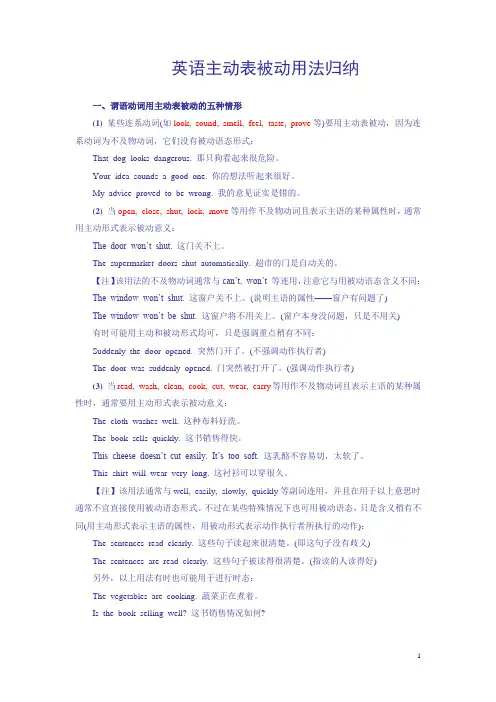
英语主动表被动用法归纳一、谓语动词用主动表被动的五种情形(1)某些连系动词(如look, sound, smell, feel, taste, prove等)要用主动表被动,因为连系动词为不及物动词,它们没有被动语态形式:That dog looks dangerous. 那只狗看起来很危险。
Your idea sounds a good one. 你的想法听起来很好。
My advice proved to be wrong. 我的意见证实是错的。
(2)当open, close, shut, lock, move等用作不及物动词且表示主语的某种属性时,通常用主动形式表示被动意义:The door won’t shut. 这门关不上。
The supermarket doors shut automatically. 超市的门是自动关的。
【注】该用法的不及物动词通常与can’t, won’t 等连用,注意它与用被动语态含义不同:The window won’t shut. 这窗户关不上。
(说明主语的属性——窗户有问题了)The window won’t be shut. 这窗户将不用关上。
(窗户本身没问题,只是不用关)有时可能用主动和被动形式均可,只是强调重点稍有不同:Suddenly the door opened. 突然门开了。
(不强调动作执行者)The door was suddenly opened. 门突然被打开了。
(强调动作执行者)(3)当read, wash, clean, cook, cut, wear, carry等用作不及物动词且表示主语的某种属性时,通常要用主动形式表示被动意义:The cloth washes well. 这种布料好洗。
The book sells quickly. 这书销售得快。
This cheese doesn’t cut easily. It’s too soft. 这乳酪不容易切,太软了。
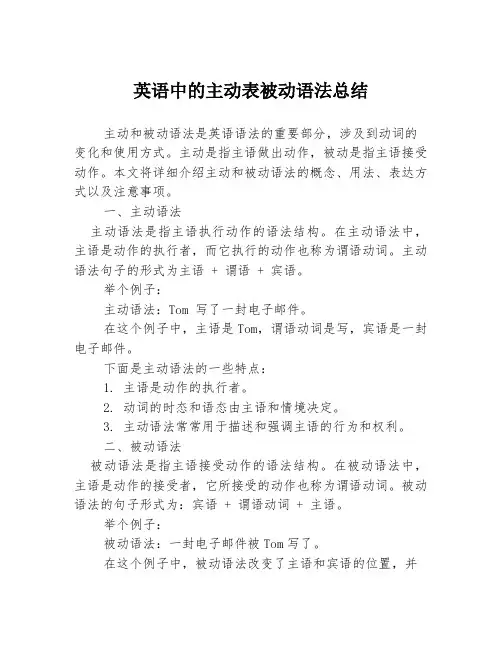
英语中的主动表被动语法总结主动和被动语法是英语语法的重要部分,涉及到动词的变化和使用方式。
主动是指主语做出动作,被动是指主语接受动作。
本文将详细介绍主动和被动语法的概念、用法、表达方式以及注意事项。
一、主动语法主动语法是指主语执行动作的语法结构。
在主动语法中,主语是动作的执行者,而它执行的动作也称为谓语动词。
主动语法句子的形式为主语 + 谓语 + 宾语。
举个例子:主动语法:Tom 写了一封电子邮件。
在这个例子中,主语是Tom,谓语动词是写,宾语是一封电子邮件。
下面是主动语法的一些特点:1. 主语是动作的执行者。
2. 动词的时态和语态由主语和情境决定。
3. 主动语法常常用于描述和强调主语的行为和权利。
二、被动语法被动语法是指主语接受动作的语法结构。
在被动语法中,主语是动作的接受者,它所接受的动作也称为谓语动词。
被动语法的句子形式为:宾语 + 谓语动词 + 主语。
举个例子:被动语法:一封电子邮件被Tom写了。
在这个例子中,被动语法改变了主语和宾语的位置,并加上了be动词和动词过去分词,即被写。
在被动语法中,谓语动词与被动语态结合,形成谓语动词的过去分词形式。
下面是被动语法的一些特点:1. 被动语法强调的是动作的接受者。
2. 谓语动词是被动语态的形式,即be动词和动词过去分词的结合。
3. 被动语法常用于描述对象或行动正在发生的情况。
三、主动语法和被动语法之间的转换1. 主动语法转换为被动语法将主动语法转换为被动语法,需要按照以下步骤操作:① 把主语变为被动语态中的主语。
② 将原来的谓语动词改为被动语态的谓语动词,即be 动词和动词过去分词的结合,根据时态和语态的不同而变化。
③ 将原来的宾语变为主动形式时要用介词by引领。
举个例子:主动语法:Tom 写了一封电子邮件。
被动语法:一封电子邮件被Tom写了。
2. 被动语法转换为主动语法将被动语法转换为主动语法,需要按照以下步骤操作:① 将被动语态中的主语变为主动语态中的宾语。

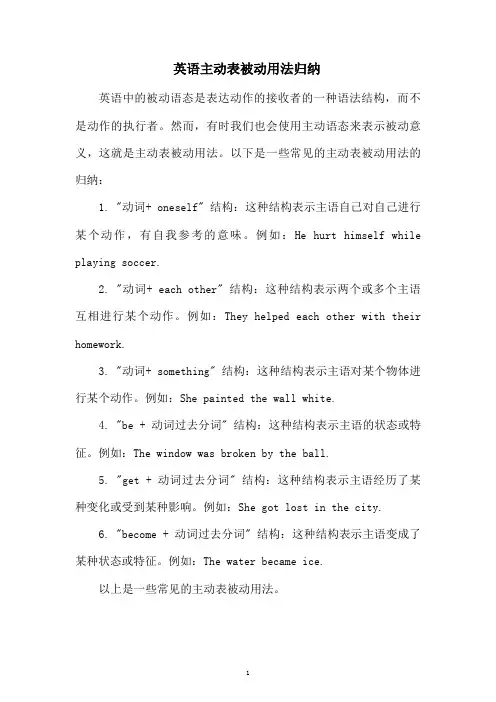
英语主动表被动用法归纳
英语中的被动语态是表达动作的接收者的一种语法结构,而不是动作的执行者。
然而,有时我们也会使用主动语态来表示被动意义,这就是主动表被动用法。
以下是一些常见的主动表被动用法的归纳:
1. "动词+ oneself" 结构:这种结构表示主语自己对自己进行某个动作,有自我参考的意味。
例如:He hurt himself while playing soccer.
2. "动词+ each other" 结构:这种结构表示两个或多个主语互相进行某个动作。
例如:They helped each other with their homework.
3. "动词+ something" 结构:这种结构表示主语对某个物体进行某个动作。
例如:She painted the wall white.
4. "be + 动词过去分词" 结构:这种结构表示主语的状态或特征。
例如:The window was broken by the ball.
5. "get + 动词过去分词" 结构:这种结构表示主语经历了某种变化或受到某种影响。
例如:She got lost in the city.
6. "become + 动词过去分词" 结构:这种结构表示主语变成了某种状态或特征。
例如:The water became ice.
以上是一些常见的主动表被动用法。
1。
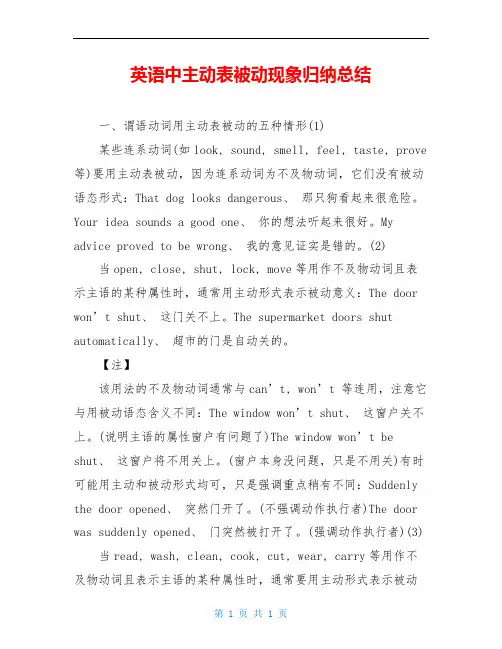
英语中主动表被动现象归纳总结一、谓语动词用主动表被动的五种情形(1)某些连系动词(如look, sound, smell, feel, taste, prove 等)要用主动表被动,因为连系动词为不及物动词,它们没有被动语态形式:That dog looks dangerous、那只狗看起来很危险。
Your idea sounds a good one、你的想法听起来很好。
My advice proved to be wrong、我的意见证实是错的。
(2) 当open, close, shut, lock, move等用作不及物动词且表示主语的某种属性时,通常用主动形式表示被动意义:The door won’t shut、这门关不上。
The supermarket doors shut automatically、超市的门是自动关的。
【注】该用法的不及物动词通常与can’t, won’t 等连用,注意它与用被动语态含义不同:The window won’t shut、这窗户关不上。
(说明主语的属性窗户有问题了)The window won’t be shut、这窗户将不用关上。
(窗户本身没问题,只是不用关)有时可能用主动和被动形式均可,只是强调重点稍有不同:Suddenly the door opened、突然门开了。
(不强调动作执行者)The door was suddenly opened、门突然被打开了。
(强调动作执行者)(3) 当read, wash, clean, cook, cut, wear, carry等用作不及物动词且表示主语的某种属性时,通常要用主动形式表示被动意义:The cloth washes well、这种布料好洗。
The book sells quickly、这书销售得快。
This cheese doesn’t cut easily、It’s too soft、这乳酪不容易切,太软了。
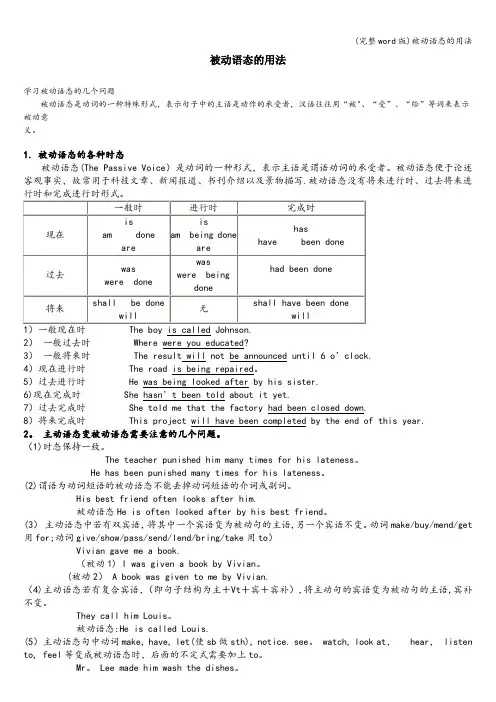
被动语态的用法学习被动语态的几个问题被动语态是动词的一种特殊形式,表示句子中的主语是动作的承受者,汉语往往用“被"、“受”、“给”等词来表示被动意义。
1. 被动语态的各种时态被动语态(The Passive Voice)是动词的一种形式,表示主语是谓语动词的承受者。
被动语态便于论述客观事实,故常用于科技文章、新闻报道、书刊介绍以及景物描写.被动语态没有将来进行时、过去将来进The boy is called Johnson.2)一般过去时 Where were you educated?3)一般将来时 The result will not be announced until 6 o’clock.4)现在进行时 The road is being repaired。
5)过去进行时 He was being looked after by his sister.6)现在完成时 She hasn’t been told about it yet.7)过去完成时 She told me that the factory had been closed down.8)将来完成时 This project will have been completed by the end of this year.2。
主动语态变被动语态需要注意的几个问题。
(1)时态保持一致。
The teacher punished him many times for his lateness。
He has been punished many times for his lateness。
(2)谓语为动词短语的被动语态不能丢掉动词短语的介词或副词。
His best friend often looks after him.被动语态He is often looked after by his best friend。
(3)主动语态中若有双宾语,将其中一个宾语变为被动句的主语,另一个宾语不变。
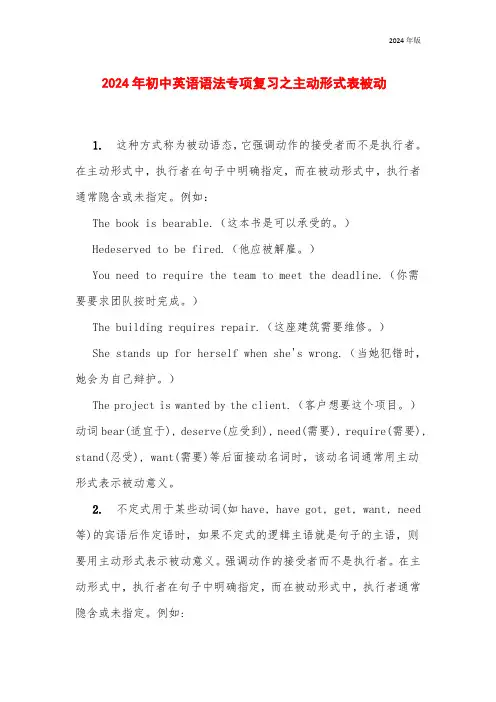
2024年初中英语语法专项复习之主动形式表被动1.这种方式称为被动语态,它强调动作的接受者而不是执行者。
在主动形式中,执行者在句子中明确指定,而在被动形式中,执行者通常隐含或未指定。
例如:The book is bearable.(这本书是可以承受的。
)Hedeserved to be fired.(他应被解雇。
)You need to require the team to meet the deadline.(你需要要求团队按时完成。
)The building requires repair.(这座建筑需要维修。
)She stands up for herself when she's wrong.(当她犯错时,她会为自己辩护。
)The project is wanted by the client.(客户想要这个项目。
)动词bear(适宜于), deserve(应受到), need(需要), require(需要), stand(忍受), want(需要)等后面接动名词时,该动名词通常用主动形式表示被动意义。
2.不定式用于某些动词(如have, have got, get, want, need 等)的宾语后作定语时,如果不定式的逻辑主语就是句子的主语,则要用主动形式表示被动意义。
强调动作的接受者而不是执行者。
在主动形式中,执行者在句子中明确指定,而在被动形式中,执行者通常隐含或未指定。
例如:She has got a new job.(她已经找到了一份新工作。
)He needs to get a haircut.(他需要理一下头发。
)I want to go on vacation next month.(我想下个月去度假。
)The building is need of repair.(这座建筑需要维修。
)注意:不定式的逻辑主语不是句子的主语,则应用被动式。
例如: She needs to be trained as an astronaut.(她需要接受宇航员培训。
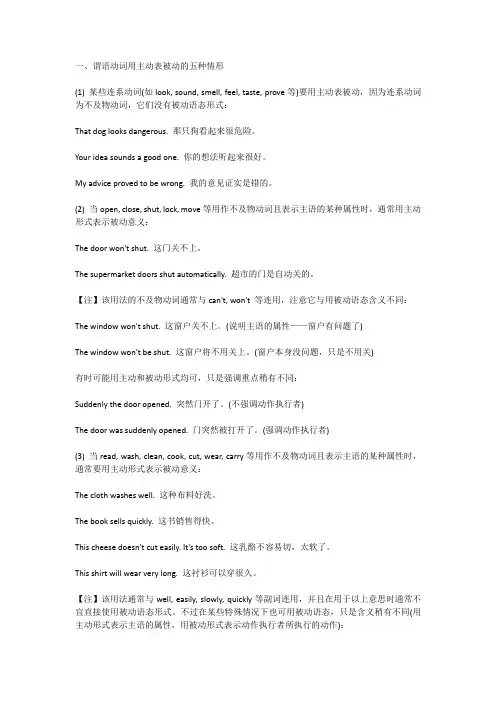
一、谓语动词用主动表被动的五种情形(1) 某些连系动词(如look, sound, smell, feel, taste, prove等)要用主动表被动,因为连系动词为不及物动词,它们没有被动语态形式:That dog looks dangerous. 那只狗看起来很危险。
Your idea sounds a good one. 你的想法听起来很好。
My advice proved to be wrong. 我的意见证实是错的。
(2) 当open, close, shut, lock, move等用作不及物动词且表示主语的某种属性时,通常用主动形式表示被动意义:The door won't shut. 这门关不上。
The supermarket doors shut automatically. 超市的门是自动关的。
【注】该用法的不及物动词通常与can't, won't 等连用,注意它与用被动语态含义不同:The window won't shut. 这窗户关不上。
(说明主语的属性——窗户有问题了)The window won't be shut. 这窗户将不用关上。
(窗户本身没问题,只是不用关)有时可能用主动和被动形式均可,只是强调重点稍有不同:Suddenly the door opened. 突然门开了。
(不强调动作执行者)The door was suddenly opened. 门突然被打开了。
(强调动作执行者)(3) 当read, wash, clean, cook, cut, wear, carry等用作不及物动词且表示主语的某种属性时,通常要用主动形式表示被动意义:The cloth washes well. 这种布料好洗。
The book sells quickly. 这书销售得快。
This cheese doesn't cut easily. It's too soft. 这乳酪不容易切,太软了。
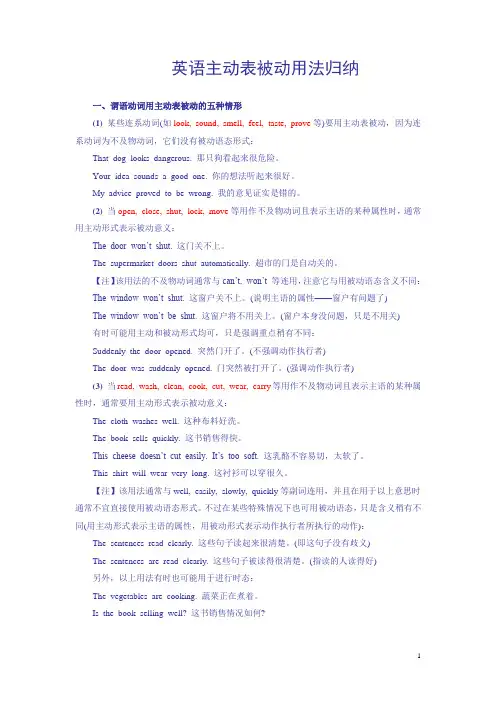
英语主动表被动用法归纳一、谓语动词用主动表被动的五种情形(1)某些连系动词(如look, sound, smell, feel, taste, prove等)要用主动表被动,因为连系动词为不及物动词,它们没有被动语态形式:That dog looks dangerous. 那只狗看起来很危险。
Your idea sounds a good one. 你的想法听起来很好。
My advice proved to be wrong. 我的意见证实是错的。
(2)当open, close, shut, lock, move等用作不及物动词且表示主语的某种属性时,通常用主动形式表示被动意义:The door won’t shut. 这门关不上。
The supermarket doors shut automatically. 超市的门是自动关的。
【注】该用法的不及物动词通常与can’t, won’t 等连用,注意它与用被动语态含义不同:The window won’t shut. 这窗户关不上。
(说明主语的属性——窗户有问题了)The window won’t be shut. 这窗户将不用关上。
(窗户本身没问题,只是不用关)有时可能用主动和被动形式均可,只是强调重点稍有不同:Suddenly the door opened. 突然门开了。
(不强调动作执行者)The door was suddenly opened. 门突然被打开了。
(强调动作执行者)(3)当read, wash, clean, cook, cut, wear, carry等用作不及物动词且表示主语的某种属性时,通常要用主动形式表示被动意义:The cloth washes well. 这种布料好洗。
The book sells quickly. 这书销售得快。
This cheese doesn’t cut easily. It’s too soft. 这乳酪不容易切,太软了。
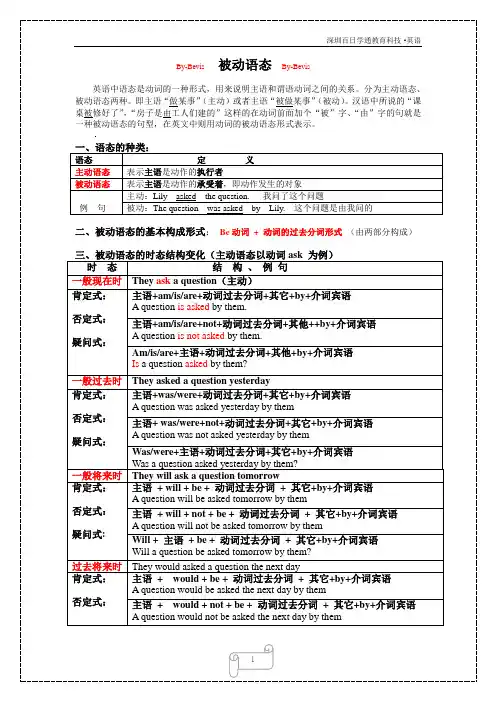
By-Bevis 被动语态By-Bevis英语中语态是动词的一种形式,用来说明主语和谓语动词之间的关系。
分为主动语态、被动语态两种。
即主语“做某事”(主动)或者主语“被做某事”(被动)。
汉语中所说的“课桌被修好了”,“房子是由工人们建的”这样的在动词前面加个“被”字、“由”字的句就是一种被动语态的句型,在英文中则用动词的被动语态形式表示。
一、语态的种类:语态定义主动语态表示主语是动作的执行者被动语态表示主语是动作的承受着,即动作发生的对象例句主动:Lily asked the question. 我问了这个问题被动:The question was asked by Lily. 这个问题是由我问的二、被动语态的基本构成形式:Be动词+ 动词的过去分词形式(由两部分构成)三、被动语态的时态结构变化(主动语态以动词ask 为例)时态结构、例句一般现在时They ask a question(主动)肯定式:否定式:疑问式:主语+am/is/are+动词过去分词+其它+by+介词宾语A question is asked by them.主语+am/is/are+not+动词过去分词+其他++by+介词宾语A question is not asked by them.Am/is/are+主语+动词过去分词+其他+by+介词宾语Is a question asked by them?一般过去时They asked a question yesterday肯定式:否定式:疑问式:主语+was/were+动词过去分词+其它+by+介词宾语A question was asked yesterday by them主语+ was/were+not+动词过去分词+其它+by+介词宾语A question was not asked yesterday by themWas/were+主语+动词过去分词+其它+by+介词宾语Was a question asked yesterday by them?一般将来时They will ask a question tomorrow肯定式:否定式:疑问式: 主语+ will + be + 动词过去分词+ 其它+by+介词宾语A question will be asked tomorrow by them主语+ will + not + be + 动词过去分词+ 其它+by+介词宾语A question will not be asked tomorrow by themWill + 主语+ be + 动词过去分词+ 其它+by+介词宾语Will a question be asked tomorrow by them?过去将来时They would asked a question the next day肯定式:否定式:主语+ would + be + 动词过去分词+ 其它+by+介词宾语A question would be asked the next day by them主语+ would + not + be + 动词过去分词+ 其它+by+介词宾语A question would not be asked the next day by them疑问式:Would + 主语+ be + 动词过去分词+ 其它+by+介词宾语Would a question be asked the next day by them?现在进行时They are asking a question now肯定式:否定式:疑问式:主语+ am/is/are + being +动词过去分词+其它+by+介词宾语A question is being asked now by them主语+am/is/are+being+not+动词过去分词+其它+by+介词宾语A question is being not asked now by them.Am/Is/Are+主语+being+动词过去分词+其它+by+介词宾语Is a question being asked now by them?过去进行时They were asking a question at that time肯定式:否定式:疑问式:主语+was/were+being+动词过去分词+其它+by+介词宾语A question was being asked at that time by them主语+was/were+being+动词过去分词+其它+by+介词宾语A question was being asked at that time by themWas/were+主语+being+动词过去分词+其它+by+介词宾语Was a question being asked at that time by them?现在完成时They have asked a question肯定式:否定式:疑问式:主语+have/has +been+动词过去分词+其它+by+介词宾语A question has been asked by them主语+have/has+not+been+动词过去分词+其它+by+介词宾语A question has not been asked by themHave/Has+主语+been+动词过去分词+其它+by+介词宾语Has a question been asked by them?过去完成时They had asked a question肯定式:否定式:疑问式:主语+had+been+动词过去分词+其它+by+介词宾语A question had been asked by them主语+ had+not+been+动词过去分词+其它+by+介词宾语A question had not been asked by themHad+主语+been+动词过去分词+其它+by+介词宾语Had aquestion been asked by them?情态动词They can ask a question肯定式:否定式:疑问式:主语+情态动词+be+动词过去分词+其它+by+介词宾语A question can be asked by them主语+情态动词+not+be+动词过去分词+其它+by+介词宾语A question can not be asked by them情态动词+主语+ +be+动词过去分词+其它+by+介词宾语Can a question be asked by them?be going to They are going to ask a question肯定式:否定式:疑问式:主语+be going to+be+动词过去分词+其它+by+介词宾语A question is going to be asked by them主语+ be going to +be+动词过去分词+其它+by+介词宾语A question is not going to be asked by themBe going to +主语+ +be+动词过去分词+其它+by+介词宾语Is a question going to be asked by them?练习:用横线划出下列句子的主语、谓语动词、宾语,并改成被动语态1.Students clean the classroom every day2. She is taking care of the children3. Someone has turned on the light4. They can finish all the work before July 20th5. We were building a new system now6. My cousin gave me a present last Christmas7. Our government will set up a new hospital next year8. She told them to wait her for a moment9. They are going to go over again this lesson this night10. She had handed in the paper before Miss wang came in四、主动语态与被动语态的互换1.主动语态:主语+ 谓语动词+ 宾语+ 状语Eg. We clean the classroom every day.被动语态:主语+ be+动词过去分词+ 状语+ by+介词宾语The classroom is cleaned every day by us2.主动语态:主语+ 谓语动词+ 间接宾语+ 直接宾语+ 状语He gave me five yuan yesterday被动语态:主语+ be + 动词过去分词+ 保留宾语(直宾/间宾) + 状语+ by介词宾语Eg. I was given five yuan yesterday by him Five yuan was given to me yesterday by him练习:将下列主动语态变成被动语态1. I write a letter every day2. Eli showed us a photo of his family(2种方法)3. He gave me a present4. We call her our good doctor5. They kept us waiting for a long time6. She will look after the children7. You should clean your room every day8. We respect our teachers五、被动语态的用法基本用法例句1.不知道或没必要说出动作的执行者时,by 短语常省略1.Paper was first invented in China.纸是中国首先发明的(不知是谁)2. Our school was set up in 2003我们学校是03年建立的(不必指明是谁建立的)2.强调动作的承受者时1.These boys are taken good care of by her. (强调这些孩子)这些孩子由她很好的照顾着2. Many houses were destroyed in the flood很多房屋被洪水摧毁3. 科技文献或新闻报道为体现客观性1. It is said that this disease is caused by a specific virus据报道,这种病是由一种特殊的病毒引起的4. 为表礼貌或委婉,避免提及动作执行者或说话人自己1. Smoking is not allowed in the library图书馆禁止吸烟2. Everybody is expected to obey the following rules希望大家遵守以下规定六、主动不能变被动的情况不能变被动的情况例句不及物动词作谓语We study hard 我们努力学习及物动词的宾语是表地点、处所、组织、国家等名称时1.He left his hometown ten years ago他10年前离开了家乡2.The students entered the classroom one by one学生们陆续地进了教室某些表状态或关系的及物动词、短语动词,只有主动语态四个“发生”:happen, take place, occur, break outLook like看起来像,mean意味着,own拥有,join参加,等…eg: In the past 30 years, great changes has taken plance in our country 在过去的30年,我们国家发生了巨大的变化There be句型There are a lot of deskes in the classroom教室里有许多桌子主系表句型He is a clever boy. 他是个聪明的男孩have作谓语动词We have three meals a day. 我们一日吃三餐反身代词作宾语He taught himself English.他自学英语相互代词作宾语They know each other. 他们彼此认识动名词、不定式作宾语1.They enjoy swimming with us他们喜欢和我们一起游泳2.She wants to be a teacher.她想成为一位老师There be句型There are a lot of desks in the classroom教室里有许多桌子七、用主动表被动的一些情况1. worth“值得”后接动词ing,用主动形式表被动意义The book is worth reading 这本书值得一读2系动词用主动表被动:smell闻起来,taste尝起来,look看起来,sound听起来,feel感觉起来The food tasted delicious. 这食物很好吃3.有些有及物动词转化的不及物动词,当主语为物时,由主动表被动:sell卖,write写,wash洗,wear穿,read读,等…The pen writes well这笔很好写The cloth washes well easily这布很容易洗注:1. A make / let / have B do “A使B做某事”变被动语态时需改成B is /are made/had/let to do…“B被迫做某事”eg: His parents make him study hard at home他父母让他每天努力学习He was made to study hard at home 他被迫在家努力学习2. Have sth done “让某事被做”, have后接物时,用动词过去分词形式表被动eg: I must have my bike repaired, it is broken. 我的单车坏了,我必须修理它练习:一、用动词的适当形式填空1. The War (break) out in 19372. Chinese (speak) by more and more people around the world3. We (tell)to close the windows before lefting the lab4. I don’t think sixteen-year-olds should (allow) to go to bars5. How long have Mr. And Mrs.David (marry) ?6. They (make) give up the picnic by the heavy rain7. This world can’t (understand) by the foreigners8. Lily’s bedroom is too dirty, she must have it (clean) now9. Workers (make) work from morning to night in the past10. All the work must (do) in two days11. The water is too dirty for us (swim)in.12. I often make him (laugh) druing the break time13. the trees (plant) in the park next Saturday?14. Thy often (help) each other15. She is a good cook, the fish (taste) delicious16. This beautiful song is wonderful , it worth (listen)17. Bikes widely (use) by Chinese18. When this kind of computer (use)?19. This kind of desk (make) of wood20. My brother (build) a new plane model these days二、按要求转换句型1. The book may be kept for two weeks. (对画线部分提问)the book ? 2. We have collected about one thousand models (对画线部分提问)Stamps collected?3.We must send her to a hospital at once (改为被动语态)must to a hospital at once4.You can renew the book for another week. (改为被动语态)The book for another week5. . Rice is grown in the south of China (改成主动语态,people作主语)in the south of China6. Your homework must be handed in today (改成主动语态)in your homework today7. the boy, the glass, by, broken, was (连词成句)8. factory, small, this, kind, made, is, a , bike, of, in (连词成句)9. 工人们在过去被迫一天工作12小时The workers for 12hours a day一、用动词的适当形式填空1. The War (break) out in 19372. Chinese (speak) by more and more people around the world3. We (tell)to close the windows before lefting the lab4. I don’t think sixteen-year-olds should (allow) to go to bars5. How long have Mr. And Mrs.David (marry) ?6. They (make) give up the picnic by the heavy rain7. This world can’t (understand) by the foreigners8. Lily’s bedroom is too dirty, she must have it (clean) now9. Workers (make) work from morning to night in the past10. All the work must (do) in two days11. The water is too dirty for us (swim)in.12. I often make him (laugh) druing the break time13. the trees (plant) in the park next Saturday?14. Thy often (help) each other15. She is a good cook, the fish (taste) delicious16. This beautiful song is wonderful , it worth (listen)17. Bikes widely (use) by Chinese18. When this kind of computer (use)?19. This kind of desk (make) of wood20. My brother (build) a new plane model these days二、按要求转换句型1. The book may be kept for two weeks. (对画线部分提问)the book ? 2. We have collected about one thousand models (对画线部分提问)Stamps collected?5.We must send her to a hospital at once (改为被动语态)must to a hospital at once6.You can renew the book for another week. (改为被动语态)The book for another week5. . Rice is grown in the south of China (改成主动语态,people作主语)in the south of China6. Your homework must be handed in today (改成主动语态)in your homework today7. the boy, the glass, by, broken, was (连词成句)8. factory, small, this, kind, made, is, a , bike, of, in (连词成句)9. 工人们在过去被迫一天工作12小时The workers for 12hours a day。
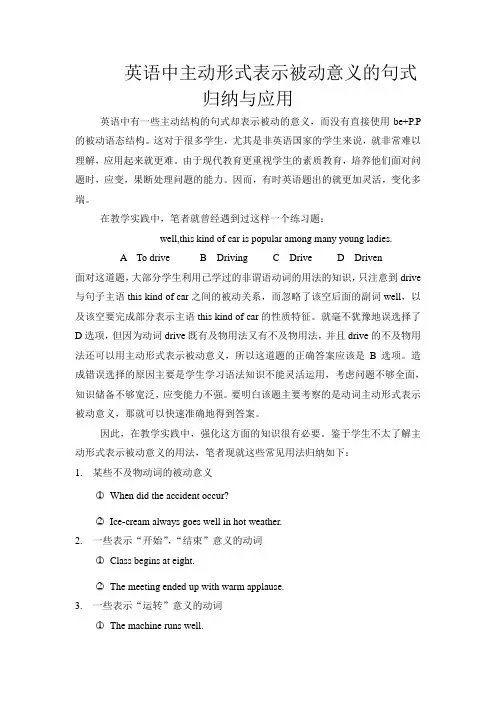
英语中主动形式表示被动意义的句式归纳与应用英语中有一些主动结构的句式却表示被动的意义,而没有直接使用be+P.P 的被动语态结构。
这对于很多学生,尤其是非英语国家的学生来说,就非常难以理解,应用起来就更难。
由于现代教育更重视学生的素质教育,培养他们面对问题时,应变,果断处理问题的能力。
因而,有时英语题出的就更加灵活,变化多端。
在教学实践中,笔者就曾经遇到过这样一个练习题:________well,this kind of car is popular among many young ladies.A To driveB DrivingC DriveD Driven面对这道题,大部分学生利用已学过的非谓语动词的用法的知识,只注意到drive 与句子主语this kind of car之间的被动关系,而忽略了该空后面的副词well,以及该空要完成部分表示主语this kind of car的性质特征。
就毫不犹豫地误选择了D选项,但因为动词drive既有及物用法又有不及物用法,并且drive的不及物用法还可以用主动形式表示被动意义,所以这道题的正确答案应该是B选项。
造成错误选择的原因主要是学生学习语法知识不能灵活运用,考虑问题不够全面,知识储备不够宽泛,应变能力不强。
要明白该题主要考察的是动词主动形式表示被动意义,那就可以快速准确地得到答案。
因此,在教学实践中,强化这方面的知识很有必要。
鉴于学生不太了解主动形式表示被动意义的用法,笔者现就这些常见用法归纳如下:1.某些不及物动词的被动意义○1When did the accident occur?○2Ice-cream always goes well in hot weather.2.一些表示“开始”,“结束”意义的动词○1Class begins at eight.○2The meeting ended up with warm applause.3.一些表示“运转”意义的动词○1The machine runs well.○2His voice records well.4.read,write,translted,drive等动词与表示行为方式的状语连用时○1The book sells well.○2My pen writes smoothly.○3The play reads more earily then acts. 类似用法的动词还有:act,cut,break,wash,wear,cook,lock,sell,tear,keep,feel,born,strike,last等。
被动语态主动表被动1) 表示状态特征的连系动词+adj./n.,用主动式表被动义。
(look,sound,feel,smell,taste, prove, appear,make,...)The steel feels cold.2) 表示“开始、结束、运动”的动词用主动式表被动义。
(begin,open,start,stop,end,finish,shut, move,run,...)The shop opens at 6 am. every day.3) 表示主语的属性特征的动词+副词well/ badly/easily/smoothly,用主动式表被动义。
(read,write,set,sell,wash, clean, wear, open,cook,lock,shut,dry,eat,drink,...)The pen writes smoothly.4) 作“需要”讲的want/need/require后接动名词作宾语时,用主动式表被动义;当然也可接不定式的被动式作宾语。
Your jacket needs washing/ to be washed.5) 不定式在某些形容词后作状语,且和句子的主语(或宾语)构成动宾关系时,用主动式表被动义。
(difficult,easy,hard,fit,pleasant,good, comfortable,light,heavy, dangerous, safe,...) • e fish is not fit to eat.6) 不定式作后置定语,与被修饰的名词构成动宾关系,又和该句主语(或宾语)构成主谓关系时,用主动式表被动义;但若用在there be结构中,主动、被动均可(口语中常用主动式)。
•I have a lot of homework to do.•There are many things to do/to be done.7) be to blame表示“应受批评,责备”,用主动式表被动义。
1. 通过学习本课,能够全面掌握哪些词往往用主动表被动意义。
2. 通过学习本课,能够初步使用主动形式表被动造句。
重点:特殊词汇特殊用法。
难点:灵活运用主动语态和被动语态。
1. 被动语态是中学英语的基础语法之一,而主动表被动又是特殊用法,所以考试时颇受关注。
2. 能熟练记忆并运用主动表被动的词汇是考查的目的。
情景交际1. 掌握下面三个话题的交际用语。
2. 学会在日常生活中运用这三个话题的交际用语。
重点:1. My favourite sport is... 我最喜欢的体育运动是……2. The advantage/ disadvantage is… 优点是……/缺点是……3. In order to help/save… 为了帮助/救助……4. We should protect…from… 我们应该保护……免受……难点:观点讨论。
主动表被动1. 系动词look, sound, feel, smell, taste, appear, seem, go, prove, turn, stay, become, get, grow, keep等+形容词/名词构成的系表结构。
The steel feels cold. 钢摸起来很凉。
His plan proved practical. 他的计划被证明很实用。
2.表示开始、结束、运动的动词,如begin, finish, start, open, stop, run, move等。
Work began at 7 o’clock this morning. 早上7点钟开始工作。
The shop closes at 6 p.m. every day. 这个商店下午6点关门。
3.表示主语某种属性特征的动词,如read, write, act, cut, draw, sell, wash, clean等。
这类动词一般不单独使用,常有一个修饰语。
This coat dries easily. 这件外衣容易干。
英语主动表被动用法归纳一、谓语动词用主动表被动的五种情形(1)某些连系动词(如look, sound, smell, feel, taste, prove 等)要用主动表被动,因为连系动词为不及物动词,它们没有被动语态形式:That dog looks dangerous. 那只狗看起来很危险。
Your idea sounds a good one. 你的想法听起来很好。
My advice proved to be wrong. 我的意见证实是错的。
(2)当open, close, shut, lock, move 等用作不及物动词且表示主语的某种属性时,通常用主动形式表示被动意义:The door won' tshut. 这门关不上。
The supermarket doors shut automatically. 超市的门是自动关的。
【注】该用法的不及物动词通常与can't,won't 等连用,注意它与用被动语态含义不同:The window won' tshut. 这窗户关不上。
(说明主语的属性——窗户有问题了)The window won' tbe shut. 这窗户将不用关上。
(窗户本身没问题,只是不用关)有时可能用主动和被动形式均可,只是强调重点稍有不同:Suddenly the door opened. 突然门开了。
(不强调动作执行者)The door was suddenly opened. 门突然被打开了。
(强调动作执行者)(3)当read, wash, clean, cook, cut, wear, carry 等用作不及物动词且表示主语的某种属性时,通常要用主动形式表示被动意义:The cloth washes well. 这种布料好洗。
The book sells quickly. 这书销售得快。
This cheese doesn 'ctut easily. It 'toso soft. 这乳酪不容易切,太软了。
主动结构表示被动意义是高中语法内容的重点和难点,也是高考的热点。
英语中的被动语态是一种复杂的语言表达形式,它常常受到句意和谓语动词的制约,如“The material feels soft”不能写成“The material is felt soft”。
现在谈谈主动形式表示被动意义的几种情况。
一、英语中,一般只有及物动词或不及物动词与介词、副词构成的短语才用在被动结构中,不及物动词不能用于被动结构中。
但某些不及物动词和短语动词的主动形式含有被动意义。
例如:When did the accident happen?交通事故是什么时候发生的?When did the war break out?战争是何时爆发的?Ice-cream always goes well in summer.冰淇淋在夏天总是很好卖。
二、有些及物动词,如act, add, burn, close, compare, cook, cut, digest, draw, feel, keep, last, lock, open, pay, pull, read, sell, shut, smoke, spread, strike, teach, tear, wash, wear, write 等,在某些情况下用作不及物动词,其形式上是主动的,意义是被动的。
例如:The shop opens from 9 a.m. to 10 p.m.这家商店从上午九点到下午十点营业。
This kind of cloth washes well.这种布很耐洗。
The clothes wear well.这种衣服很耐穿。
The books sell well.这些书很畅销。
三、一些表示状态特征的动词的主动形式表示被动意义,这种动词可分为如下几类。
1.表示感官的动词:appear, look, seem, sound, smell, taste, feel等。
(1) 某些连系动词( 如 look, sound, smell, feel, taste, prove等)要用主动表被动,因为连系动词为不及物动词,它们没有被动语态形式:That dog looks dangerous.那只狗看起来很危险。
Your idea sounds a good one.你的想法听起来很好。
My advice proved to be wrong.我的意见证实是错的。
(2) 当 open, close,shut, lock, move等用作不及物动词且表示主语的某种属性时,通常用主动形式表示被动意义:The door won't shut.这门关不上。
The supermarket doors shut automatically.超市的门是自动关的。
【注】该用法的不及物动词通常与can't, won't等连用,注意它与用被动语态含义不同:The window won't shut.这窗户关不上。
( 说明主语的属性——窗户有问题了)The window won't be shut.这窗户将不用关上。
( 窗户本身没问题,只是不用关)有时可能用主动和被动形式均可,只是强调重点稍有不同:Suddenly the door opened.突然门开了。
( 不强调动作执行者)The door was suddenly opened.门突然被打开了。
( 强调动作执行者)(3) 当 read, wash, clean, cook, cut, wear, carry等用作不及物动词且表示主语的某种属性时,通常要用主动形式表示被动意义:The cloth washes well.这种布料好洗。
The book sells quickly.这书销售得快。
This cheese doesn't cut easily. It's too soft.这乳酪不容易切,太软了。
This shirt will wear very long.这衬衫可以穿很久。
【注】该用法通常与well, easily,slowly, quickly等副词连用,并且在用于以上意思时通常不宜直接使用被动语态形式。
不过在某些特殊情况下也可用被动语态,只是含义稍有不同( 用主动形式表示主语的属性,用被动形式表示动作执行者所执行的动作) :The sentences read clearly.这些句子读起来很清楚。
( 即这句子没有歧义)The sentences are read clearly.这些句子被读得很清楚。
( 指读的人读得好)另外,以上用法有时也可能用于进行时态:The vegetables are cooking.蔬菜正在煮着。
Is the book selling well?这书销售情况如何?(4) 某些表示开始和结束的动词(begin, start, finish, end等),当主语为事物且不强调动作的执行者时,可用主动形式表示被动意义:When does the concert begin?音乐会什么时候开始?The play ended at ten o’clock.戏10点钟结束。
(5)有的动词本身含有被动意味,通常用主动形式来表示被动含义:Where is the new film showing?这部新电影在哪里放映?My skirt caught on a nail.我的裙子被钉子钩住了。
Soon the house filled with people.很快房子就挤满了人。
二、非谓语动词用主动表被动的八种情形(1)不定式 to blame, to let用作表语时,通常要用主动形式表示被动意义:Who is to blame?该怪谁呢?The house is to let.此屋出租。
(2)某些“ be+形容词 +to do ”结构中的不定式通常要用主动形式表示被动意义:The question is difficult to answer.这问题很难回答。
Your writing is impossible to read.你的书写没法认。
Do you think the water is safe to drink?你认为这水喝起来安全吗?【注】①这类结构的特点是句子主语就是其后不定式的逻辑宾语,按理说其中的不定式要用被动形式,但习惯上却要用主动表被动。
这类形容词常见的有awkward, convenient, dangerous, difficult, easy, hard,impossible, interesting, nice, pleasant, safe, tough, tricky, unpleasant等。
② 有时形容词后跟有名词,在名词后用作定语的不定式用主动形式表示被动意义:It's a difficult book to read.那是一本难读的书。
It is a pleasant thing to remember.这是一件值得记住的愉快的事。
③有少数用于类似结构的形容词( 如 fit,ready, free等),其中的不定式用主动式和被动式均可:The water is not fit to drink [to be drunk].这水不适合饮用。
The letters are ready to post [to be posted].这信已准备好可以寄了。
(3) 不定式用于某些动词( 如 have, have got, get, want, need等)的宾语后作定语时,如果不定式的逻辑主语就是句子的主语,则要用主动形式表示被动意义:I have some letters to write.我有一些信要写。
I want something to drink.我想喝点什么。
I want to get something to read.我想找点东西阅读。
【注】如果不定式的逻辑主语不是句子的主语,则应用被动式,比较:I have something to type.我有些东西要打( 字 ) 。
( 指自己打字 )I have something to be typed.我有些东西要打( 字 ) 。
( 指请人打字 )(4) 不定式用于某些双宾动词( 如 give, show,buy, lend,get 等 ) 的直接宾语后作定语时,如果不定式的逻辑主语就是直接宾语前的间接宾语,通常用主动形式表示被动意义:Give me some magazines to read.给我几本杂志看。
He lent me some magazines to read.他借给我一些杂志看。
【注】如果不定式的逻辑主语不是直接宾语前的间接宾语,则应用被动式,比较:He will show you the path to take.他将告诉你走什么道路。
He will show you the room to be used as the meeting-room.他将带你去看看用作会议室的房间。
但有时两者区别不大:Give me a list of the people to invite [to be invited].把需要邀请的人员名单给我。
(5)不定式用于修饰“ there be+ 名词”中的名词时,可用主动式,也可用被动式,有时含义差不多:There is too much work to do [to be done].要做的工作太多了。
但有时含义有差别( 不定式用主动式可视为其前省略了for sb,用被动式可视为其后省略了by sb) :There is nothing to do.无事可做。
(含有无聊之意)There is nothing to be done.不能做什么了。
( 指没有办法了 )There is nothing to see.没什么可看的。
( 即不值一看 )There is nothing to be seen.没看见什么。
(指没东西看)(6) 涉及副词 enough 和 too 的主动表被动。
在t oo to do sth和enough to do sth这两个结构中,若句子主语与其后不定式为to do sth 被动关系,则该不定式通常用主动形式表示被动意义 ( 但也可直接用被动式) :The writing is too faint to read [to be read].这笔迹太模糊,看不清。
These boxes are not strong enough to use [to be used] as a platform.这些箱子不够牢,不能用作站台。
但在某些特别强调被动意义的语境中,可能用被动式更恰当:He spoke in a voice too low to be heard.他说话的声音太低,听不见。
He is too young to be sent to America for advanced study.他太年轻,不能送到美国去深造。
(7)be worth 后的动名词要用主动表被动:In all, the book is worth reading.总之,这本书值得一读。
This might be worth thinking about.这可能值得考虑。
【注】与 worth 相似的 worthy 却不一样,其后不接动名词而接不定式( 若接动名词则其前应有介词 of) ,且要用被动式表示被动含义:This book is worthy to be read [of being read].这本书值得一读。
(8)在 need, want, require 等少数表示“需要”的动词后的动名词用主动形式表被动意义:The plants want watering every day.这些花草得天天浇水。
This wall requires repairing.这面墙需要修理了。
【注】① 以上结构中的动名词改用不定式则要用被动式表示被动意义:This sentence needs explaining [to be explained].这个句子需要解释。
② 它们后接名词时也可表示被动意义:It needs no explanation.它无需解释。
This plan requires careful consideration.这项计划需要仔细考虑。
三、介词短语用主动表被动的六种情形(1)“ beyond+名词”:The rumor is beyond belief.这谣言难以置信。
The children were beyond control.这些孩子不听管教。